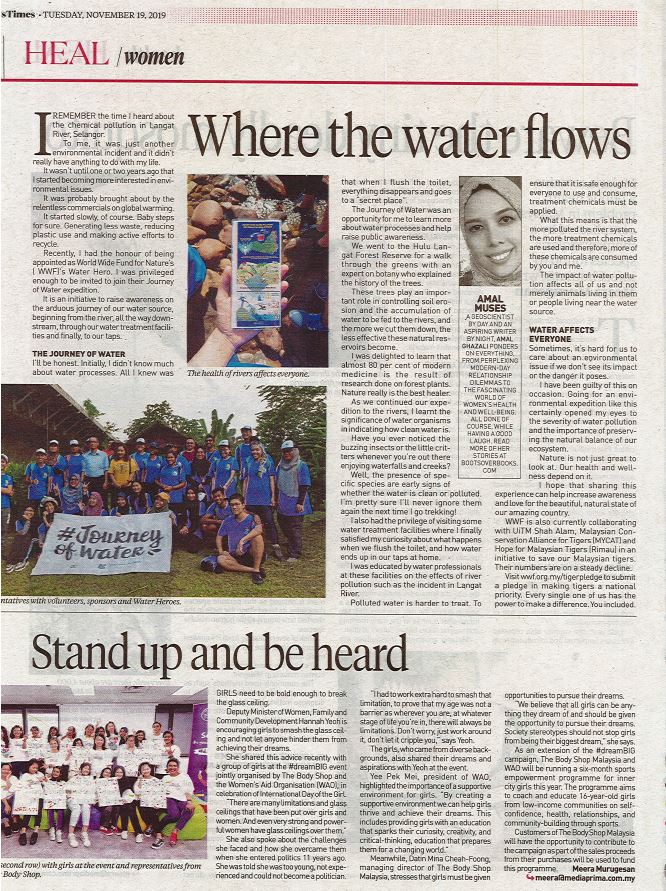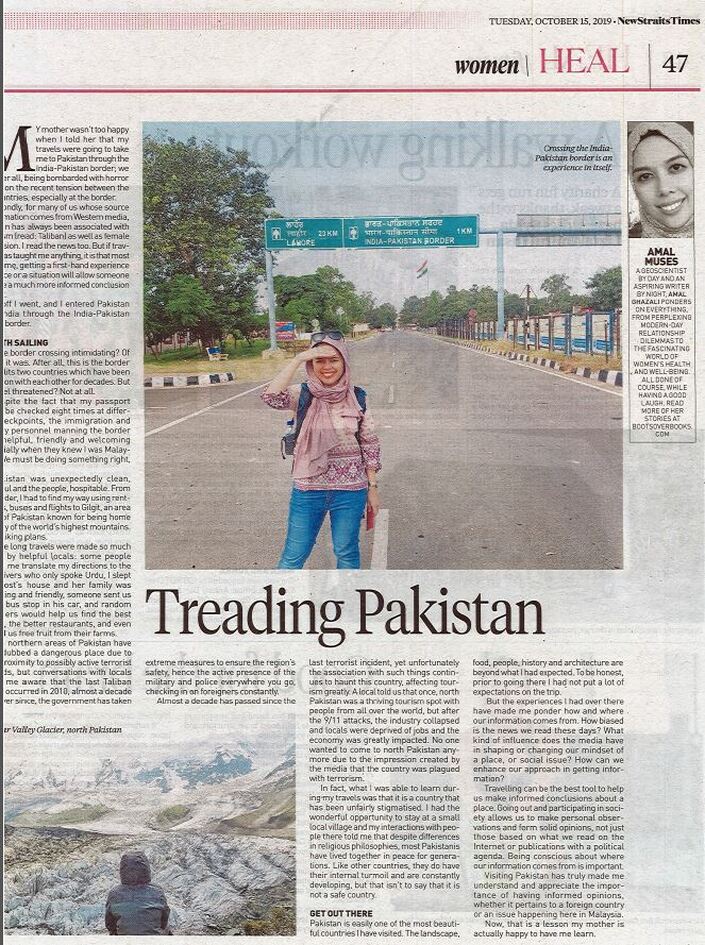|
Where The Water Flows
By Amal Ghazali I remember the time when I heard the news about the chemical pollution of Langat River, Selangor. “Oh, that’s so unfortunate,” I said, feeling sympathetic for about one minute and thirty seconds, until an email alert about a shopping sale came up and I forgot all about it. I never really bothered to keep up on its following events again. For me it sounded like just another environmental incident somewhere far away, and didn’t really have anything to do with my life. It wasn’t until one or two years ago that I started becoming more interested in environmental issues. It was probably brought on by the relentless commercials on global warming (so I guess commercials can be good sometimes!), and the increase of social media talks around this subject that got me intrigued to want to learn more about them and how I could play a part in making a positive impact. It started slowly, of course, with the baby steps of making less waste, and eventually grew into reducing plastic use and making active efforts to recycle. Three weeks ago, I had the honour of being appointed as World Wild Fund’s (or more popularly known as WWF) ‘Water Hero’, and I was privileged enough to be invited to join their ‘Journey Of Water’ expedition. The Journey Of Water is basically an initiative to raise awareness on the arduous journey of our water source, beginning from the feeding of the river all the way to downstream, through our water treatment facilities and finally to the taps of our homes. The Journey Of Water Alright, I’ll be honest. I didn’t know much about water processes in the first place. All I knew was that when I flush the toilet, they all disappear and go to a ‘secret place’. On days when the water pressure is low at my house, I’d join the Twitter-verse on the rant of why we seem to have water shortage issues despite living in a tropical country where it rains all the time. I’ve had my moments of curiosity about the processes of water, and the Journey Of Water was an opportunity for me to learn more and help raise public awareness for it. The thing that struck me the most about the entire experience was learning how our country’s ecosystem is just one huge perfect balance of water cycle. That is, of course, until human civilisation came into the picture with the unfortunate side effects of logging, deforestation, pollution and excessive waste production. We went to Hulu Langat Forest Reserve for a walk through the greens with a botanic expert who explained the history of the trees and how the Early Malaysia began logging activities as part of the growing economy in exporting high quality wood and amber. These trees play and important role in controlling soil erosion and the accumulation of water to be fed to the rivers, and the more we cut them down, the less effective these natural reservoirs become. I was also delighted to learn that almost 80% of modern medicine is derived from research done on forest plants - in a way, nature really is the best healer. As we continued our expedition to the rivers, I was able to learn the significance of water organisms in indicating how clean the water really is. I was in awe of the academicians and scientific professors who were there and showed me how much work they have done in analysing water and its quality surrounding our communities. Did you ever notice the buzzing insects or the little critters whenever you’re out there enjoying the waterfalls and creeks? The presence of specific species are early signs of whether the water is clean or polluted, and I’m pretty sure I’ll never ignore them again the next time I go trekking. I also had the privilege to visit some water treatment facilities, where I finally fed my curiosity about what happens when we flush the toilet, and how water ends up at our taps at home. I was educated by the water professionals at these facilities about the effects of river pollution such as the incident in Langat River not too long ago. Polluted water is harder to treat, and to ensure that it is safe enough for everyone to use and consume, treatment chemicals must be applied to them. What this means is that the more polluted the river system, the more treatment chemicals are used, and therefore more of these chemical are consumed by you and I. The impact of water pollution affects all of us, and not just merely animals living in them or people living near the water source. Water Affects Everyone Sometimes, it’s harder for us to care much about an environmental issue if we don’t directly see its impact on us or the real danger it poses. I am also guilty of this on some occasions. However, going for an environmental expedition like the this had certainly opened my eyes to the severity of water pollution and the importance of preserving the natural balance of our ecosystem. It’s not just because nature is great to look at. It’s also because our health and wellness depend on it. I am hoping that my sharing of this experience can help increase our awareness and love for the beautiful natural state of our amazing country. At the same time, I am so appreciative of the opportunity to be introduced to the many local NGOs who work tirelessly to educate the public on important environmental issues surrounding us. WWF is also currently collaborating with UiTM Shah Alam, MYCAT (Malaysian Conservation Alliance for Tigers) and RIMAU (Hope for Malaysian Tigers) in an initiative to urge the prioritization of preserving Malaysian tigers, whose numbers are on a steady decline. Please visit wwf.org.my/tigerpledge to submit your plegde in making tigers a national priority. Every single one of us have the power to make a difference, so why not you? Treading Pakistan
By Amal Ghazali My mother wasn’t too happy when I told her that this time around, my travels were going to take me to Pakistan through the India-Pakistan border. First of all, the news have been bombarding us with horror stories about the recent tension between these two countries, especially around the border regions. Secondly, for many of us whose main media is derived from the West, Pakistan has always been associated with the sentiments of terrorism (read: Talibans) as well as female oppression. I read the news too. But if travelling has taught me anything, it is that most of the time, getting a first-hand experience of a place or a situation will allow someone to make a much more informed conclusion about it as compared to just reading about it from a biased point of view. So off I went, and I entered Pakistan from India through the India-Pakistan Wagah border. Smooth Sailing Was the border crossing process intimidating? Of course it was. After all, this is the border that splits two countries who have been in crisis with each other for decades. But did I feel threatened? Not at all. Despite the fact that my passport had to be checked 8 times at different check points, the immigration and military guys manning the border were helpful, friendly and welcoming (especially when they knew I was a Malaysian. We must be doing something right, guys!). Pakistan was unexpectedly clean, beautiful and hospitable. From the border, I had to find my way through rented cars, buses and flights to get to Gilgit, an area north of Pakistan known for being a home to many of the world’s highest mountains, as I had hiking plans there. The long travels were made so much better by the helpful locals - some people helped me translate my directions to the taxi guys who only spoke Urdu, I slept over a host’s house and her family was charming and friendly, someone sent us to the bus stop with his car, and random strangers would help us find the best routes, the better restaurants, and even offered us free fruits from their farms. As I explored Pakistan, I was on high alert to see the possible consistency between what I’ve heard from the media I was exposed to versus observations I could make on my own from the time I actually spent there. The northern areas of Pakistan have been notoriously dubbed as a dangerous place to be due to its close proximity to possible active terrorist grounds, but conversations with locals informed me that the last Taliban attack occurred in 2010, almost a decade ago. Ever since, the government has taken extreme measures in ensuring the region’s safety, hence the active presence of the military and police everywhere you go, checking in on foreigners constantly. Almost a decade has passed since the last terrorist intervention, yet unfortunately the generalization of being associated with such things continue to haunt this country, affecting tourism greatly. A local told us that once, north Pakistan was a thriving tourism spot with people from all over the world, but after the 9/11 attacks the whole industry collapsed and locals were deprived of jobs and the economy was greatly impacted. No one wanted to come to north Pakistan anymore due to the impressions painted by the media that the country was plagued with terrorism. In fact, what I was able to learn from observation during my travels was that perhaps it is a country that has been unfairly stigmatised. I had the wonderful opportunity to stay at a small local village where people were in the midst of celebrating Ashura (a celebration mostly associated with the Shi’ite sect of Islam), and interactions told me that despite differences in religious philosophies, most Pakistanis have lived together in peace for generations. Like other countries they do have their internal turmoil and are constantly developing, but that isn’t to say that it is not at all a safe country to be in. Get Out There Pakistan was easily one of the most beautiful countries I have been to in my life. The landscape, the food, the people, the history and the architecture were all beyond what I had expected of it. To be honest, through my research prior to going there I had not put a lot of expectations on it - the media has managed to persuade me of this. But this experience had made me ponder on how and from where our information comes from. How biased are the news we read these days? What kind of influence can media play in shaping or changing our mindset on a place, or a social issue? How can we enhance our approach on getting information? Travelling can be the best tool in helping us make informed conclusions about a place. Going out there, participating with the society allows us to make personal observations and solid opinions, not just based merely on stuff we read on the internet or publications doused with political agenda. Being conscious about the platform and where our information comes from is also equally important. Visiting Pakistan had truly made me understand and appreciate the importance of having informed opinions, whether it pertains a different place or an issue happening right here in our home, Malaysia. Now that is a lesson my mother is actually happy to have me learn. |
Archives
October 2020
Categories
All
https:/
/www.bootsoverbooks.com/
|


